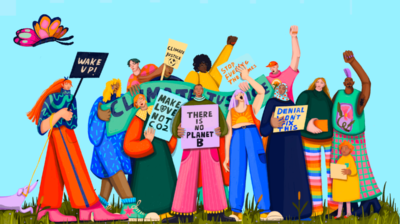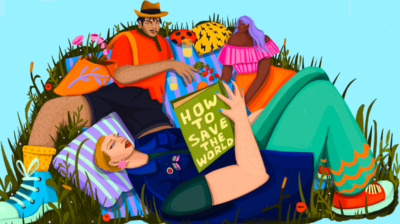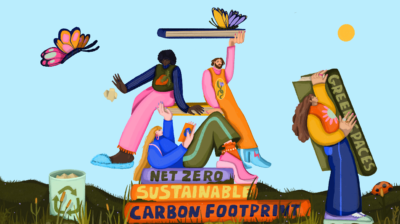Combat the climate crisis by working with nature
If we are to combat the climate crisis, we will all need to transform the way we live, work, consume, travel and most importantly, the way we treat our natural environment.

The climate crisis is a complex problem. It requires many different solutions from scientists, governments and society as a whole to be properly addressed. Many solutions put forward today are based on advanced technology, such as solar and wind power generation. However, these will not be enough to bring about the lasting change we need to reduce our greenhouse gas emissions.
If we are to combat the climate crisis, we need to transform the way we live, work, consume, and travel. Most importantly, we need to change the way we treat our natural environment. It is important to understand that humans and nature are not separate from each other and that the climate crisis affects both in equal measure.
How does the climate crisis affect the natural world?
The climate crisis is primarily driven by a buildup of greenhouse gases in the atmosphere. Greenhouse gas emissions are released by human activities such as burning fossil fuels (like coal, oil and gas), deforestation and agriculture. Most of these human activities require taking natural resources from the earth. Cutting down trees, digging up minerals, and using large amounts of water is widespread. However, little thought is given to the long-term damage this does to the environment.
As a result of irresponsible human activity, our natural world is under threat. We are facing pressures such as habitat and species loss, water pollution, invasive species and declining soil quality.
The climate crisis only worsens these pressures and introduces new problems. Ecosystems are unable to adapt fast enough to the rapid changes in the climate. The impacts of the climate crisis on our natural environment are far-reaching and have serious consequences for the future of people and the planet.
Consequences of the climate crisis
Examples of how the climate crisis has impacted ecosystems include:
- Rising ocean temperatures and acidification- Increased carbon dioxide levels in seawater, are affecting organisms like corals, algae and crustaceans. This in turn damages wider marine ecosystems and leaves shorelines without protection from rising sea levels
- Imbalances in ecosystems – Caused by climate change as well as human interference with habitats and pollution, ecosystem imbalances are resulting in the mass extinction of species (including animals, plants and insects) across the world
- Rising temperatures are melting polar ice caps which raises sea levels. This impacts wildlife such as polar bears who rely on sea ice to survive
The damage of carbon sinks in Ireland
Environmental loss and damage is both a cause and effect of climate change. Peatlands, wetlands, soil, forests and oceans have the natural ability to trap and store carbon. They are known as carbon sinks or carbon stores and have been responsible for regulating the climate for millions of years. However, the ability of these ecosystems to trap and store carbon has been significantly reduced by environmental destruction. As a result, more carbon emissions are being released from damaged carbon sinks across the world. Today, carbon makes up the majority of greenhouse gases.
In Ireland, much of our peatlands are degraded as they have been drained and used for peat extraction, agriculture and forestry. Our peatlands, which were once healthy, resilient ecosystems working as carbon sinks, have turned into carbon sources. They are now contributing to Ireland’s rising greenhouse gas emissions.
According to the European Union, the state of nature across Europe is in alarming decline:
- 80% of habitats across Europe – such as peatlands, rivers, and forests – are in poor condition
- 71% of fish populations are in decline
- 70% of soils are in poor condition, leading to a significant loss in agricultural productivity
- 1 in 10 bee and butterfly species are on the verge of extinction
Protecting biodiversity to tackle climate change
A key concern for the health of our natural environment is biodiversity loss. Biodiversity is the variety of all life. This includes plants, animals, bacteria, and fungi found on Earth. Biodiversity is essential to the health of natural ecosystems. However, it is highly threatened by human activity and climate change and declines year on year.
Environmental activists all around the world are calling for increased global efforts to restore and protect nature. They recognise that it is our most important ally in the fight against climate change. Achieving a sustainable, climate-friendly world would be impossible without doing the work to rebuild a thriving natural environment.
What are nature-based solutions?
Nature-based solutions or ecosystem-based solutions, use the power of nature conservation and restoration to address climate change. These solutions are essential to combat the climate crisis. The healthier and more resilient our ecosystems and biodiversity are, the healthier and more resilient we can be in the face of climate change.
Nature-based solutions can reduce the vulnerability of people and their livelihoods to the effects of climate change. For example, conserving natural coastal barriers such as dunes, coral reefs and wetlands protects against the impacts of storms and flooding. These solutions are also crucial for trapping and storing carbon emissions.
Rewetting peatland that has been drained for agriculture and other human activities will restore its carbon sink capacity, assist in flood protection and allow biodiversity to thrive once again. Replanting trees will also have this same effect.
Here are some more examples of nature-based solutions to climate change:
- Creating green spaces in cities improves air quality, keeps temperatures cooler in the summer, and supports habitats for birds and other wildlife
- Restored floodplains and river beds act as natural barriers against floods and can help improve water quality
- Replanting forests can help increase water supplies in communities often affected by drought
What can we do to combat climate change?
It can be easy to lose touch with our natural surroundings and forget that we are only one part of the web of life on Earth. We rely on nature to combat the climate crisis just as much as nature relies on us. Nature is all around us. Whether we live in a city or the countryside, in facing the climate crisis we have a chance to rebuild our relationship with the natural world. We can reconnect with nature by protecting it and helping it to thrive. Here are some of the ways you can work with and for nature in your local area:
If you have a garden, allow it to grow wild
A healthy, biodiverse garden is one that has been left alone. Letting even just a small part of your garden grow wild without cutting the grass or using chemical pesticides will support pollinators and other wildlife. Learn more about saving biodiversity.
Clean up your local area
Whether you live near a woodland area, beach, public park or street, take some time to pick up any litter you find. There are many voluntary groups in Ireland doing weekly clean-ups of public areas – find out if there is one in your local community.
Work together with others
If you would like to learn more about local ecosystems and species and how to protect them, join a local conservation group. Volunteer with a citizen science project and be part of valuable environmental research on biodiversity and the climate.
Talk to your local councillors
Contact your local representatives to discuss what actions could be taken to protect and enhance the ecosystems and biodiversity in your area. They can be ideas such as planting trees and shrubs and letting grass grow. Policy to protect and restore nature can be developed in many different areas, such as climate action, community schemes and public awareness. You can come together with environmental advocacy groups lobbying politicians to adopt these policies.
If you want to find groups working with and for nature in your local area, the Manual of Environmental Justice Advocacy Map is a good place to start. Learn more about taking climate action in your local community.
Feeling overwhelmed by the climate crisis?
- Get anonymous support 24/7 with our text message support service
- Connect with a trained volunteer who will listen to you, and help you to move forward feeling better
- Free-text SPUNOUT to 50808 to begin
- Find out more about our text message support service
If you are a customer of the 48 or An Post network or cannot get through using the ‘50808’ short code please text HELLO to 086 1800 280 (standard message rates may apply). Some smaller networks do not support short codes like ‘50808’.






